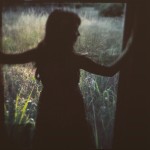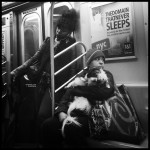This month in the Art Critique and Community we are looking at the genre of still life. A still life is, by definition, a painting, drawing or photograph of a grouping of inanimate objects. A still life is not limited to these mediums and can also span a host of subject matter. Usually the objects are common place, everyday objects. We think you will enjoy our artist this month who takes the still life to a whimsical level.
——————————————————————————–

“i’m a loner, dottie. a rebel.”
Photo by Todd Leban: I found this old box of matches in the pantry of my grandparents house. I love working with objects and developing visual ideas around them. This image was built around the rectangular shape of the box. I attempted to give the matches characteristics that people could identify with, and play around with the isolation that occurs sometimes when people dare to deviate from the norm
Critique written by Jennifer Thomas
What strikes me about this image firstly is the rhythm and repetition of the subject matter. The layout of the box, the arrangement of the matches, the line, and the textural surfaces all work to create a strong visual statement. The single match acts as a focal point that provokes the viewer to wonder why the match is separated and what is about to happen. It seems as if its part of a delectable narrative that makes the viewer anticipates the next move. The title gives us a hint about the single match and we are left to imagine the remainder of the story.
From a more formal perspective the horizontal grain of the wooden boards provides the viewer with a strong juxtaposition to the vertical matches and also links the source of the wood, paper, card and match sticks back to their origin. Clichés like “one out of the box” come to mind, but this composition has a much greater subtlety to it that goes beyond a common, ordinary comparison.
The choice of an analogous color palette in softened hues of dusky blue, grey and mint green work wonderfully together and don’t detract our attention from the narrative the matchsticks provide. In conclusion, we are presented with a strong composition and the deliberate placement of inanimate objects to achieve a desired effect, one of both harmony and expectation.

“the scream.”
What Todd had to say about his photo: I’m fascinated with tools and the hammer is one of my favorites. I don’t remember where this one came from but I know I didn’t buy it. It sits in my tool cabinet and shares the workload 50/50 with one other, a 16oz. Estwing. But those details are arbitrary to the overall recognizable shape. This image originally existed without the grid, etc., but to me was “finished” when I used the app “Tangent. I aimed to created a sense of motion with static objects.
Critique written by Jennifer Thomas
The title of this image combined with the placement of the nails give the viewer an immediate clue as to the intent of the artist. The hammer takes on an anthropomorphic quality as if a character screaming or shouting something to someone. Again the sense of rhythm and repetition provided by the “Tangent” app grid and geometric shapes help to link the craft of building/engineering and the purpose of the hammer itself. This image “works” conceptually as well as in a pictorial sense. It is unified in other ways by use of the limited color palette of muted greys, silver and the soft pink of the hammer handle.
Whenever I see the title of The Scream I can’t help but think of the German Expressionist artist Edvard Munch and his famous image of the same title painted in 1895. In the painting there is a skull like figure on a bridge with a turbulent sky behind him. I see a similar format here with the single form of the hammer and the nails spewing from its mouth. I wonder if the image would have appeared more menacing if the points of the nails were facing outwards?

“die, die my darling.”
Todd’s Description: I recently experienced a creative drought and was searching for objects to revive inspiration. I started delving into my collection of dice and found this interesting decaying bakelite piece. The depth of focus on the native camera put this object too far in the distance so I grabbed my olloclip/macro and placed the die on my bureau. After playing with several angles, I discovered this straight ahead shot. I’m always hesitant to use text in an image without agonizing over it being necessary, and found the play on words to be interesting.
Critique written by Jennifer Thomas
This image has a graphic edgy quality to it, as if it’s fallen straight out of a Tarantino plotline. The text is used as an enticing double entendre that relates both to the object and the idea. The number 3 is a powerful compositional matrix and the diagonal force of the circles adds to the dynamic quality of this image. There is very little background and the object is thrust right up into the viewer’s face. Nowhere to hide! To increase the drama a big chunk is removed from the top left of the die. An imperfection in the perfect line that adds interest and provides a counterpoint to the chosen text; ‘die’. Blue is a moody color and works well to contrast with the ivory colored Bakelite. Wow, you’ve gotta love Bakelite. I’m sure we all have a mother or grandmother who used those super jade green or salmon pinkish pieces for picnics or cups of coffee at home when we were young. This image conjures up both nostalgia of the past, as well as a sense of threat. The artist stages a chapter from a narrative, this time with menacing overtones. I love it and it’s easily the favorite of the 3 images discussed.
Our Artist:
 Todd Leban. I grew up with an intense interest in music & art, and an undying desire to create. I have a great appreciation for things that are old & worn, and have always been fascinated with objects and how they influence and enhance our lives. I try to bring out their stories in my images.
Todd Leban. I grew up with an intense interest in music & art, and an undying desire to create. I have a great appreciation for things that are old & worn, and have always been fascinated with objects and how they influence and enhance our lives. I try to bring out their stories in my images.
I’m a professional art educator at a middle school in the Chicago suburbs. I’ve been taking, making, and editing images on my phone with a serious focus for about two years.
//IG // Twitter // AMPt Community //
Our Panelist:
 Jennifer Thomas is originally from Melbourne in Australia and has Fine Arts degrees with majors in Sculpture and Printmaking. She has taught Art at large International Schools for the past 12 years and lived in Tokyo, Brussels and is now London. She was one of the featured artists on Dan Marcolina’s ipad eBook ‘Mobile Masters’ in 2012. She was also part of the Mobile Pixation and Iconiclondon exhibitions in December 2012. She is an active member of the Instagramers London group and co-curates for AMPt on Backspaces and scouts for the Mobile Artistry team on Instagram.
Jennifer Thomas is originally from Melbourne in Australia and has Fine Arts degrees with majors in Sculpture and Printmaking. She has taught Art at large International Schools for the past 12 years and lived in Tokyo, Brussels and is now London. She was one of the featured artists on Dan Marcolina’s ipad eBook ‘Mobile Masters’ in 2012. She was also part of the Mobile Pixation and Iconiclondon exhibitions in December 2012. She is an active member of the Instagramers London group and co-curates for AMPt on Backspaces and scouts for the Mobile Artistry team on Instagram.
// IG // Backspaces // IPA //
About Author
Latest stories
 Featured ArticlesApril 13, 2015The Storytellers Vol. 4
Featured ArticlesApril 13, 2015The Storytellers Vol. 4 StoriesMarch 3, 2015Momdom
StoriesMarch 3, 2015Momdom Anna CoxFebruary 24, 2015Captain and the Kid
Anna CoxFebruary 24, 2015Captain and the Kid Anna CoxJanuary 19, 2015Honest Moments by Caleb Stumpfl
Anna CoxJanuary 19, 2015Honest Moments by Caleb Stumpfl

Hey Todd, how totally amazing, its serendipity, Im an art teacher also and work with Middle and High school kids. Let’s work on some collaborations together. The Global Art room, how about some mobile photography projects?
Seriously, your images are glorious and such a delight to analyze.
xxx Jen
Yeah Todd nice work man
Thank you Jeff. Appreciate it. I’m interested in hearing how your portrait classes went!
So good! Todd, you know I love you. Jenn, fantastic write-up as always!!
Right back at you man.
Thanks Josh, it was great fun to critique these quality images. I had no idea they were Todd’s so it was all the more fun, to find out who they belonged to after Id written about them!
Have been a fan of Todd’s work for a while – love seeing this feature! Great job, Jen!
Hey Geri, it was a pleasure and a delight to have the opportunity to analyze the images.
Thank you so much Geri. Means a lot. And yes, Jen’s a great writer.
I absolutely love these wearejuxt features, but what an absolute joy it is to see you part of this Todd. Marvellous!!!s
Thank you so much Elaine. Appreciate the support:)
Excellent work Todd and great write-up Jen! 🙂
Many thanks, it was a great experience to critique Todd’s photographs.
Thank you Simran! Loved the whole experience.
@Jennifer Thomas Yes! Yes! Yes! Would love to. I’m two days into the school year, so a little crazy now, but I’d love to connect and collaborate as the year progresses. We have a class set of iPads, and a mobile photography project sounds great. I ran a club last year too. Was tons of fun and the kids loved it.